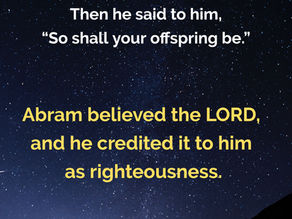Psalm 51:1-12 - Bone Crushing Love
- Chad Werkhoven
- May 8, 2024
- 4 min read
God's covenant love is both compassionate and bone crushing.
Psalm 51:1–12 (NIV)
51
For the director of music. A psalm of David. When the prophet Nathan came to him after David had committed adultery with Bathsheba.
1 Have mercy on me, O God,
according to your unfailing love;
according to your great compassion
blot out my transgressions.
2 Wash away all my iniquity
and cleanse me from my sin.
3 For I know my transgressions,
and my sin is always before me.
4 Against you, you only, have I sinned
and done what is evil in your sight;
so you are right in your verdict
and justified when you judge.
5 Surely I was sinful at birth,
sinful from the time my mother conceived me.
6 Yet you desired faithfulness even in the womb;
you taught me wisdom in that secret place.
7 Cleanse me with hyssop, and I will be clean;
wash me, and I will be whiter than snow.
8 Let me hear joy and gladness;
let the bones you have crushed rejoice.
9 Hide your face from my sins
and blot out all my iniquity.
10 Create in me a pure heart, O God,
and renew a steadfast spirit within me.
11 Do not cast me from your presence
or take your Holy Spirit from me.
12 Restore to me the joy of your salvation
and grant me a willing spirit, to sustain me.
Listen to passage & devotional:
Belgic Confession of Faith, Article 15: The Doctrine of Original Sin
We believe
that by the disobedience of Adam
original sin has been spread
through the whole human race.
It is a corruption of all nature—
an inherited depravity which even infects small infants
in their mother’s womb,
and the root which produces in man
every sort of sin.
It is therefore so vile and enormous in God’s sight
that it is enough to condemn the human race,
and it is not abolished
or wholly uprooted
even by baptism,
seeing that sin constantly boils forth
as though from a contaminated spring.
Nevertheless,
it is not imputed to God’s children
for their condemnation
but is forgiven
by his grace and mercy—
not to put them to sleep (alternate translation: This does not mean that the believers may sleep peacefully in their sin)
but so that the awareness of this corruption
might often make believers groan
as they long to be set free
from the “body of this death.”
Therefore we reject the error of the Pelagians
who say that this sin is nothing else than a matter of imitation.
Summary
David begins his beautiful and heartfelt confession of sin by appealing to God's unfailing love. Other translations describe this aspect of God's love as steadfast or loyal. The Hebrew word David uses here is ḥěʹ·sěḏ, which is the covenant love of God in which He has obligated Himself to us, His people, which often expresses itself as great compassion and abundant mercy.
Often times we associate words like compassion and mercy with a mother's soothing hug and not so much with a father's stern discipline. But Psalm 51 shows us that God's covenant love involves both. Focus in on the second half of verse 8:
...let the bones you have crushed...
Have you ever thought of God's love as being 'bone crushing' before? But yet that's exactly what God lovingly does to us when necessary. Rather than let us persist in our sins, which could never be described as compassionate or merciful since ultimately our sins lead us away from God and towards hell, God uses the weight of our guilt to crush a bone or two. As our Confession puts it, this pain brings about an "awareness of this corruption [which] might often make believers groan as they long to be set free."
Dig Deeper
Theological terms are often multi-syllable words derived from Greek or Latin that are beyond the ability of ordinary people to really understand. But not all the time. We use a pretty simple phrase to describe people who think that God really doesn't care about sin because He's so compassionate and merciful. We say they cling to 'cheap grace' (this term was first used by Dietrich Bonhoeffer in His book The Cost of Discipleship). Our Confession describes such people as those who "sleep peacefully in their sin."
The Holy Spirit seeks to wake sinners up to the danger they're in, much in the same way you might wake up a person sleeping in a burning house. Much of the time, He does this in gentle, often even difficult to perceive ways. But sometimes people are so fast asleep that more aggressive intervention is needed.
The whole point of Psalm 51 is that although at times, due completely to our own stubbornness, God must metaphorically crush our bones in order to rescue us, He doesn't leave us in that miserable condition. David's request as he confesses his sin is that the 'bones' God has crushed be made to rejoice.
God wakes us up from our sinful slumber in ways that often cause us to groan. He does this in order to restore to us the joy of His salvation.
ACKNOWLEDGE WHO GOD IS: Our Father, whose unfailing covenant love results in great compassion, which occasionally crushes our bones.
ALIGN YOUR LIFE WITH GOD'S WILL: Thank God for pricking your conscience to wake you up to the reality of your sin, and confess it before Him so that the bones God has crushed will rejoice;
ASK GOD FOR WHAT YOU NEED:
Read the New Testament in a year! Today: Matthew 25




















Comments